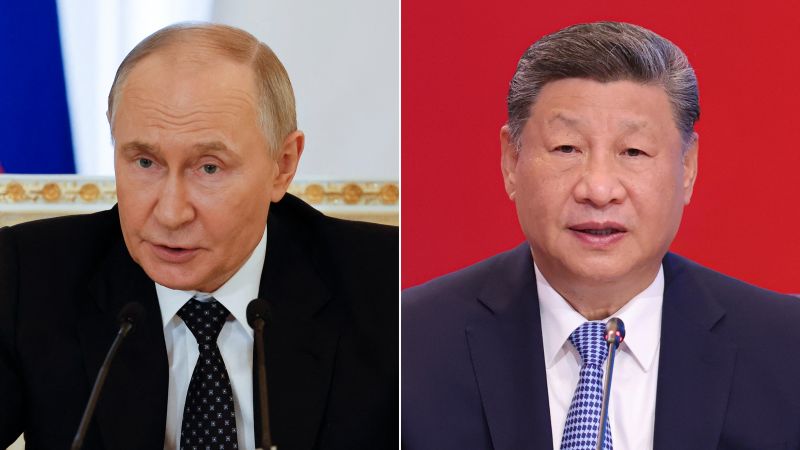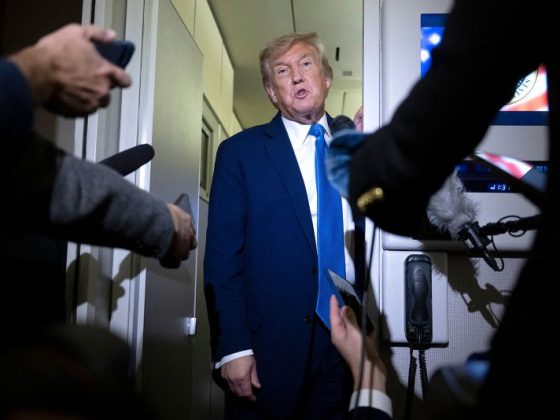China and Russia positioning themselves as voices of reason, calling for de-escalation of a conflict the United States is contemplating on entering — these are the optics Xi Jinping and Vladimir Putin sought to project during a phone call on Thursday.
As US President Donald Trump weighs joining Israel in attacking Iran, the fast-spiralling conflict between two sworn enemies in the Middle East has presented Beijing and Moscow another opportunity to cast themselves as an alternative to US power.
In their call, Putin and Xi strongly condemned Israel’s actions, calling them a breach of the UN Charter and other norms of international law, according to the Kremlin. (The elephant in the room, of course, is Russia’s own violations of international law in its ongoing war against Ukraine — which Beijing has consistently refused to condemn.)
In Beijing’s readout, Xi struck a more measured tone and stopped short of explicitly condemning Israel — unlike his foreign minister, who did just that in a call with his Iranian counterpart last week.
Instead, the Chinese leader urged the warring parties, “especially Israel,” to cease fire as soon as possible to avoid further escalation and regional spillover.
And notably, in a veiled message to Trump, Xi emphasized that “major powers” that have a special influence on the parties to the conflict should work to “cool the situation, not the opposite.”
Beijing has long accused Washington of being a source of instability and tensions in the Middle East — and some Chinese scholars are now seizing on the Iran crisis to underscore that point.
Liu Zhongmin, a Middle East expert at the Shanghai International Studies University, attributed the latest flareup to the uncertainty created by Trump’s second presidency and the chaotic, opportunistic and transactional nature of his Middle East policy.
“(Trump) has seriously undermined the authority and credibility of US policy in the Middle East, eroded America’s leadership and image among its allies while also weakening its ability to threaten and deter regional adversaries,” Liu wrote in state media this week.
Another Middle East ‘forever war’?
Some Chinese online commentators have noted that Trump appears on the brink of pulling the US deeper into another so-called forever war in the Middle East.
At the outset of his second term, officials close to Trump repeatedly stressed the need for Washington to redirect its focus and resources toward countering China’s ambitions in the Indo-Pacific. Yet five months in, the wars in Ukraine and Gaza continue to rage on — and Trump is now weighing US involvement in the Israel-Iran conflict.
Beijing has no interest in seeing an all-out war against Iran that could topple the regime. Under Supreme Leader Ayatollah Ali Khamenei, Iran has emerged as a formidable power in the Middle East and a vital counterweight to US dominance — just as China is working to expand its own diplomatic and economic footprint in the region.
In 2023, Beijing helped broker a surprise rapprochement between arch-rivals Saudi Arabia and Iran – a deal that signaled its ambition to emerge as a new powerbroker in the region.
China has long backed Iran through sustained oil imports and its seat on the UN Security Council. In recent years, the two countries have deepened their strategic ties, including holding joint naval exercises alongside Russia. Beijing welcomed Tehran into the Shanghai Cooperation Organization and BRICS – groupings led by China and Russia to challenge the US-led world order.
Iran is also a critical node in China’s Belt and Road Initiative (BRI), its global infrastructure and investment drive. The country lies near the strategic Gwadar port — a key BRI outpost in Pakistan that gives China access to the Indian Ocean — and borders the Strait of Hormuz, a vital chokepoint for Chinese oil imports from the Persian Gulf.
Like Russia, China has offered to be a potential mediator in the Israel-Iran conflict, casting its role as a peace broker and an alternative to US leadership.
During his call with Putin, Xi laid out four broad proposals to de-escalate tensions, including resolving the Iran nuclear issue through dialogue and safeguarding civilians, according to the Chinese readout.
Meanwhile, Xi’s Foreign Minister Wang Yi has had a busy week on the phone, speaking with his counterparts in Iran, Israel, Egypt and Oman in a flurry of diplomatic outreach.
Yet it remains unclear what Beijing is willing and able to do when it comes to actually mediating the conflict. In the early stages of Israel’s war on Gaza, China made a similar offer and dispatched a special envoy to the region to promote peace talks — efforts that ultimately yielded little in terms of concrete results.
Brokering peace in the Middle East is a tall order, especially for a country with little experience or expertise in mediating protracted, intractable conflicts – in a deeply divided region where it lacks a meaningful political or security presence.
And in the one conflict where China does hold significant leverage — the war in Ukraine — Xi has offered diplomatic cover and much-needed economic support to help sustain Putin’s war effort, even as China continues to cast itself as a neutral peace broker.
Still, at a time when America’s global leadership is under growing scrutiny, particularly in the eyes of the Global South, presenting itself as a voice of restraint in the Iran conflict may already count as a symbolic win for Beijing.


